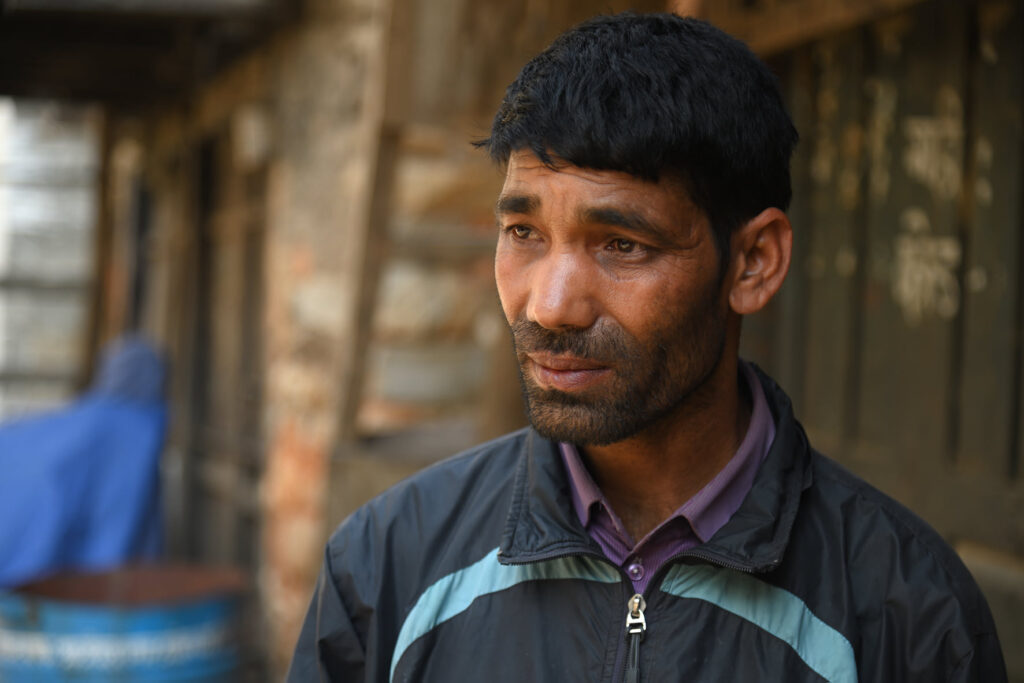
Leela Giri Aathbis municipality - 4, Rakam, Dailekh
“I am an undergraduate. I completed my bachelor’s degree three years ago. I got married here when I was in class 11. Formal education was at a halt for two years as I had to raise a son and a daughter. As they grew up, I continued my studies. My family still encourages me to study higher. But you see, pursuing a Masters degree will be difficult without attending classes on campus. I don’t have time for that as I have to take care of the children and family.
Today, I work as a field assistant for Shree Basundhara Agriculture Cooperatives. There are 401 member shareholders in the cooperatives. We encourage savings and render loans to agricultural enterprises. I also work as a treasure of Rakam Karnali CAACG. Khote Salla to Jagshi stretch of Karnali comes under the jurisdiction of our group. We won’t allow anyone to catch mother fish and their fries. We do the patrolling in turn. Every Saturday, we go there for monitoring in a group of 5-6.
In the beginning, we were targeted by our own relatives as we didn’t let them use nets with small mesh sizes. They took it as an ego issue and blamed that we were doing it because we couldn’t eat small fish. They even challenged us saying that the fish in the river is a public good and they would catch it anyway. We had registered our group in the municipality. So we went to the municipal office and talked to the Mayor. Those challengers were called to the municipality office and we had a meeting in the participation of local police as well. They were explained with the laws regarding fishing. And then only those activities came under control.
Initially, it was difficult for those who earn their living from fishing but with the help of the Paani Program, we supported them in building their own fishing pond. We provided them with fries and feed. They were also supported with tunnels for vegetable farming. In that way, we gave alternatives to those who relied on fishing for livelihood.There were lots of challenges initially while working for conservation, especially financial. Moreover, there’s a shortage of electricity in this area. Our members are provided with refrigerators and solar dryers. There’s a rule to do the marketing of fish only via our cooperatives. However, we can’t handle all those fish as our refrigerators can’t operate due to the shortage of electricity.
It was very difficult to convince people about the importance of conservation issues. But the mayor is with us to implement the rules and regulations. We have successfully put an end to the use of illegal nets and fishing fries. But it is difficult to monitor at night. That is when some people hide and do the fishing. Anyway, I can say that the unsustainable practices of catching fish have decreased significantly.
Our conservation group gathers on the first day of every month to clean the Karnali river. There’s a rule against catching fries and mother fish. Chhapke nets with small mesh sizes are also prohibited in fishing. There’s a 15 member committee for regular monitoring in order to make sure everything is as per the rules. With the support of the Pani project, we have been assisting our members in order to construct fishing ponds as well. When the drought season arrives, water levels in the river go down and these ponds become a lifeline for their livelihood. 8 men and 7 women, including 4 from Dalit communities, make our conservation group very inclusive.I told you that I was born in Surkhet, where the presence of rivers is very limited. There’s only one river called Bheri which is very far. After getting married, I was so delighted to be in the proximity of rivers. I was married to a Majhi, a member of the fishermen community. Some of my relatives weren’t happy with it, initially, as they thought I was hitched to a lower caste, though my parents were totally fine with it. But now all of them are happy to see that I was creating a difference and travelling a lot. I invited my parents last year to visit me. They commented that the place was very beautiful but were suspicious about the customs prevailing in our community. They had been continuously asking me to return home to Surkhet. However, my family here has always supported me, sometimes even more than my husband. Therefore, I couldn’t leave them.
In the initial days, I wasn’t treated well by my husband. As soon as I came here, I joined the adult literacy campaign for 6 months. I had to travel frequently to district headquarters for training and all. My husband didn’t like that initially. At that time, my in-laws had supported me. But now, even my husband has understood everything and supports every endeavour of my life.There’s an influence of local politics in our conservation efforts as well. Local representatives of wards want to support their voters only and ignore those who voted against them. So whenever any organisation announces a vacancy, I tell them to take a fair examination and not to heed the local leaders. If they really want to recruit as per their wishes, why do the drama of announcing a vacancy? Not just about vacancies, even the programs are endorsed and rejected according to the political affiliation of those who are implementing them. Even in our conservation works, whenever a committee has to be formed, they have hidden intentions of selecting members based on political connections.
I also teach my kids about the conservation of nature. In fact, my son is very close to nature and is very curious. He asks me about the phenomenon of nature and teaches me as well.”
Leela Giri, Aathbis municipality – 4, Rakam, Dailekh





